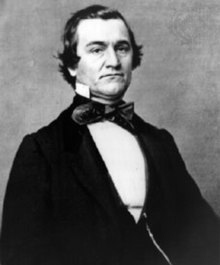William Lowndes Yancey
| William Yancey | |
|---|---|
 |
|
|
Confederate States Senator from Alabama |
|
|
In office February 18, 1862 – July 27, 1863 |
|
| Preceded by | Constituency established |
| Succeeded by | Robert Jemison |
| Member of the U.S. House of Representatives from Alabama's 3rd district |
|
|
In office December 2, 1844 – September 1, 1846 |
|
| Preceded by | Dixon Lewis |
| Succeeded by | James Cottrell |
| Personal details | |
| Born |
August 10, 1814 Warren County, Georgia, US |
| Died | July 27, 1863 (aged 48) Montgomery, Alabama, US |
| Political party | Democratic |
| Alma mater | Williams College |
William Lowndes Yancey (August 10, 1814 – July 27, 1863) was a journalist, politician, orator, diplomat and an American leader of the Southern secession movement. A member of the group known as the Fire-Eaters, Yancey was one of the most effective agitators for secession and rhetorical defenders of slavery. An early critic of John C. Calhoun and nullification, by the late 1830s Yancey began to identify with Calhoun and the struggle against the forces of the anti-slavery movement. In 1849, Yancey was a firm supporter of Calhoun's "Southern Address" and an adamant opponent of the Compromise of 1850.
Throughout the 1850s, Yancey, sometimes referred to as the "Orator of Secession", demonstrated the ability to hold large audiences under his spell for hours at a time. At the 1860 Democratic National Convention, Yancey, a leading opponent of Stephen A. Douglas and the concept of popular sovereignty, was instrumental in splitting the party into Northern and Southern factions. At the 1860 convention, he used the phrase “squatter sovereignty” in a speech he gave to describe popular sovereignty.
During the American Civil War, Yancey was appointed by Confederate President Jefferson Davis to head a diplomatic delegation to Europe in the attempt to secure formal recognition of Southern independence. In these efforts, Yancey was unsuccessful and frustrated. Upon his return to America in 1862, Yancey was elected to the Confederate States Senate where he was a frequent critic of the Davis Administration. Suffering from ill health for much of his life, Yancey died during the war at the age of 48.
Yancey’s mother, Caroline Bird, lived on the family home (nicknamed "the Aviary") located near the falls of the Ogeechee River in Warren County, Georgia. On December 8, 1808, she married Benjamin Cudworth Yancey, a lawyer in South Carolina who had served on the USS Constellation during the Quasi-War with France. Yancey was born at "the Aviary"; three years later, on October 26, 1817, his father died of yellow fever. He was probably named for William Lowndes (1782-1822), who represented South Carolina in Congress at the time that Yancey was born.
...
Wikipedia
